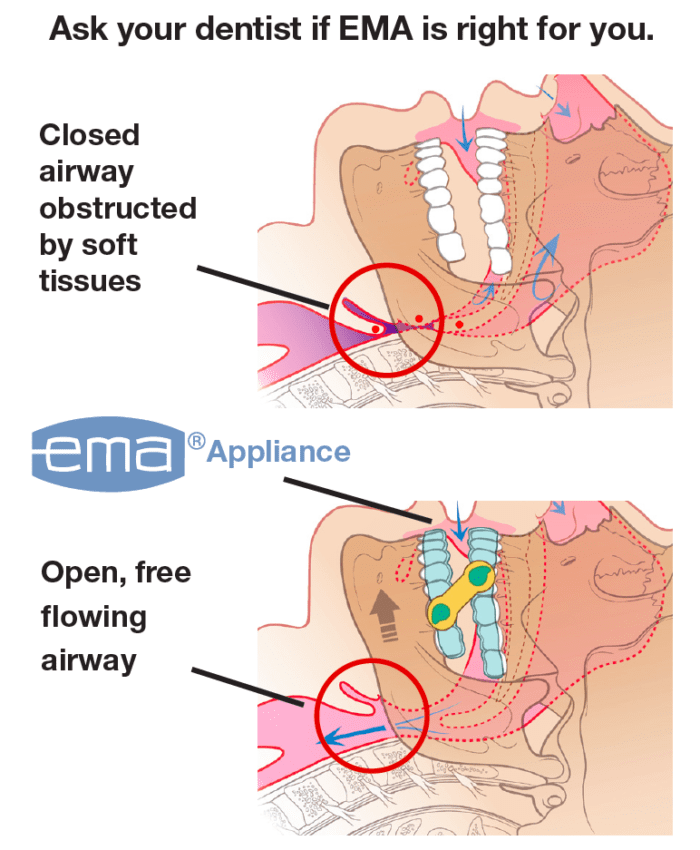Dr. Frank Henrich Provides Sleep Apnea Treatment for All Ages
If you find yourself struggling with sleepless nights and a definite lack of energy, you might be suffering from Sleep Apnea. This is a very serious condition that affects as many as 44 million people in the United States. Despite the severity of the situation, estimates suggest that 80 or 90% of people who suffer from this condition don’t receive the help they need.
Obstructive Sleep Apnea (OSA) is a medical condition where your tongue and soft tissues actually close off your airway and stop air from entering your lungs. When this happens during sleep, the oxygen in your blood decreases, your heart races, and your brain panics–causing you to startle awake. After a few good breaths, the cycle repeats itself, all night long.
The most common way to treat Sleep Apnea is with a CPAP (Continuous Positive Airway Pressure) machine. This machine supplies a constant and steady flow of air through a hose, mask, or nose piece. Some people who are diagnosed with OSA may not be properly using the CPAP machine, or are intolerant. This is because the machine can be uncomfortable.
There is another option! For mild to moderate cases, our dentist in Tulsa can create a custom oral appliance to treat Sleep Apnea. In some cases, in severe Sleep Apnea, a CPAP and oral appliance may be used in conjunction.
Signs & Symptoms of Sleep Apnea
- Fatigue, sleepiness
- Snoring
- Hypertension
- Depression
- Diabetes
- Obesity
- Gasping, choking, or coughing during sleep
- Morning headaches
- Irritability
- Dry mouth and/or sore throat in the morning
- Decreased sex drive
- Impaired concentration/memory loss
- Driving and work-related accidents
- Irregular heart beat
- Restless leg syndrome
Obstructive Sleep Apnea (OSA) Facts:
- 44 million Americans are affected, with 80 million more reporting occasional problems.
- Snoring increases the chances of hardening of the arteries in the neck.
- In the U.S., motor vehicle crashes are a leading cause of injury, morbidity and mortality. Sleep related accidents comprise 15-20% of all motor vehicle crashes.
- OSA & Sleep related chronic diseases (Type II Diabetes, Hypertension, Stroke/TIA, Obesity, Coronary Artery Disease, Congestive Heart Failure) annual cost exceed $1 Trillion.
- Snoring is NOT NORMAL in children–1-3% of snoring children have OSA (Tonsils and Adenoids are the largest contributing factor).
- 70% of heart attack patients have mild OSA.
- 43% of patients with mild OSA have Hypertension.
- 86% of obese Type II Diabetic patients suffer from OSA.
- 48% of Type II Diabetes suffer from Sleep Apnea.
- OSA patients are 4 times more at risk for Stroke.
Obstructive Sleep Apnea (OSA) Simple Self-Assessment
Answer the questions below to find out if you might be at risk of having OSA. Then, call Henrich Dental today to schedule a free consult with Dr. Henrich to discuss your OSA self-assessment.
Use the following scale to choose the most appropriate number for each situation:
0 = would never doze or sleep
1 = slight chance of dozing or sleeping
2 = moderate chance of dozing or sleeping
3 = high chance of dozing or sleeping
- Sitting and reading___
- Watching TV___
- Sitting, inactive in a public place___
- As a passenger in a car for an hour or more___
- Lying down to rest in the afternoon___
- Sitting and talking to someone___
- Sitting quietly after a lunch (without alcohol)___
- Stopped for a few minutes in traffic while driving___
TOTAL SCORE: ____ (add the scores up)
Your results can be interpreted as follows:
0-5 Lower Normal Daytime Sleepiness
6-10 Higher Normal Daytime Sleepiness
11-12 Mild Excessive Daytime Sleepiness
13-15 Moderate Excessive Daytime Sleepiness
16-24 Severe Excessive Daytime Sleepiness
Epworth Sleepiness Scale, M.W. Johns 1990-97
Sleep Apnea Treatment Options
 Dr. Henrich, in partnership with your medical doctors, can help you understand, screen, and treat your mild to moderate Sleep Apnea. With the use of a custom-made oral appliance, Dr. Henrich can provide you with a comfortable and easy-to-use option for a more restful sleep.
Dr. Henrich, in partnership with your medical doctors, can help you understand, screen, and treat your mild to moderate Sleep Apnea. With the use of a custom-made oral appliance, Dr. Henrich can provide you with a comfortable and easy-to-use option for a more restful sleep.
Sleep Apnea needs to be properly diagnosed in an overnight sleep study by a doctor specializing in sleep medicine, who will then recommend the most effective treatment for your situation. It is our goal at Henrich Dental to provide you with the treatment you need to rediscover a restful night’s sleep.
Oral Appliance Therapy
Oral appliance therapy (OAT) is an effective treatment option for patients with mild to moderate obstructive Sleep Apnea (OSA). Although CPAP therapy is the first line of treatment for Sleep Apnea, many patients prefer an oral appliance to CPAP. An oral appliance fits in the mouth like a sports mouth guard or orthodontic retainer. Oral appliances help prevent the collapse of the tongue and soft tissues in the back of the throat.
They keep the airway open during sleep and promoting adequate air intake. Oral appliances may be used alone or in combination with other treatments for sleep-related breathing disorders, such as weight management, surgery or CPAP.
Dr. Henrich is a member of the American Academy of Craniofacial Pain. He recently completed a Sleep Medicine & Dentistry Mini-Residency in Atlanta, Georgia. He continually is seeking training to increase his knowledge and skillset to better serve his patients.

What are the risk factors for sleep apnea?
There are several obvious risk factors for sleep apnea. The most common one is obesity. Other risk factors include being male, having a large neck circumference, having a family history of it, genetics, consuming alcohol, and using tobacco. The best way to avoid developing sleep apnea is take care of your health!
If I snore, does it mean that I have sleep apnea?
Snoring is very common and this symptom alone does not mean you have sleep apnea. However, it is the most common symptom of Obstructive Sleep Apnea (OSA). We recommend visiting your doctor if you snore as well as suffer from other signs of sleep apnea and have any of the risk factors. A sleep study can be performed to determine if you do in fact suffer from OSA.
Are there any long term risks of sleep apnea?
Yes, sleep apnea can negatively affect your overall health in many ways. It will increase your risk of developing heart disease, cancer, suffering from a stroke, and death. Sleep apnea can also contribute to diabetes. Treating your sleep apnea is imperative and should be taken seriously so that your long term health does not suffer.
